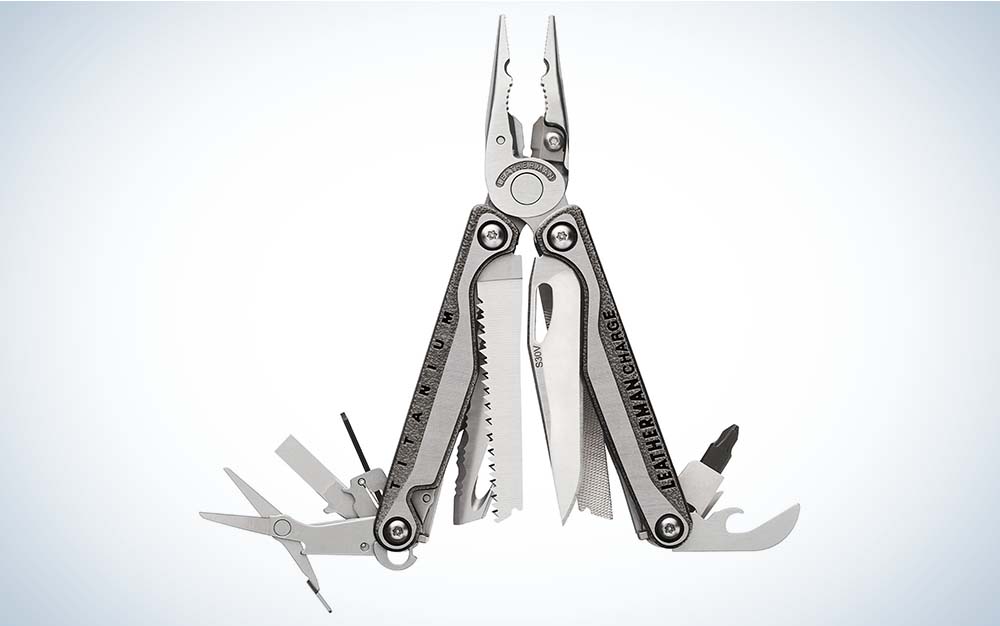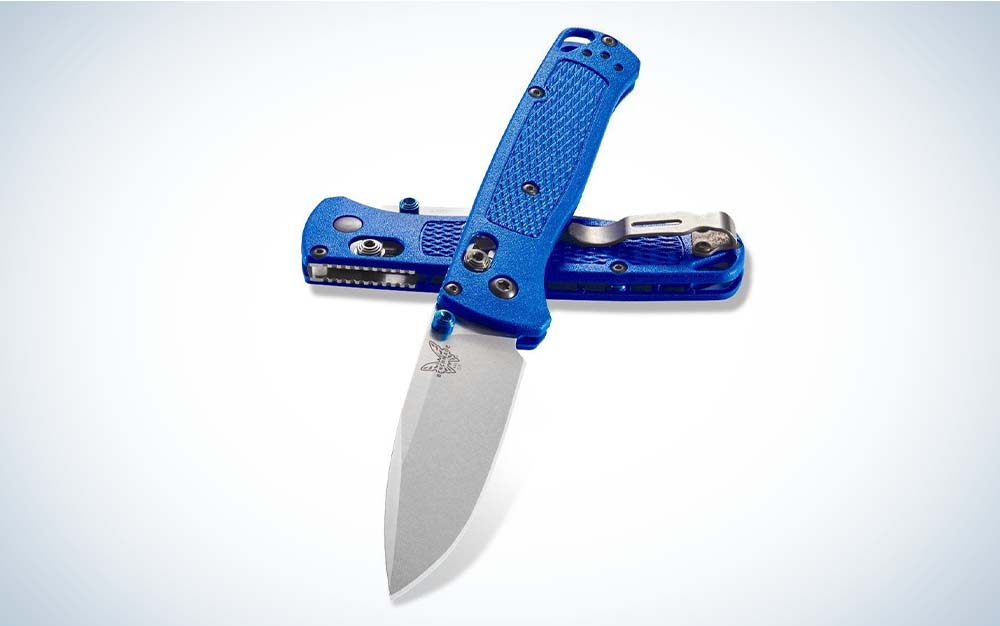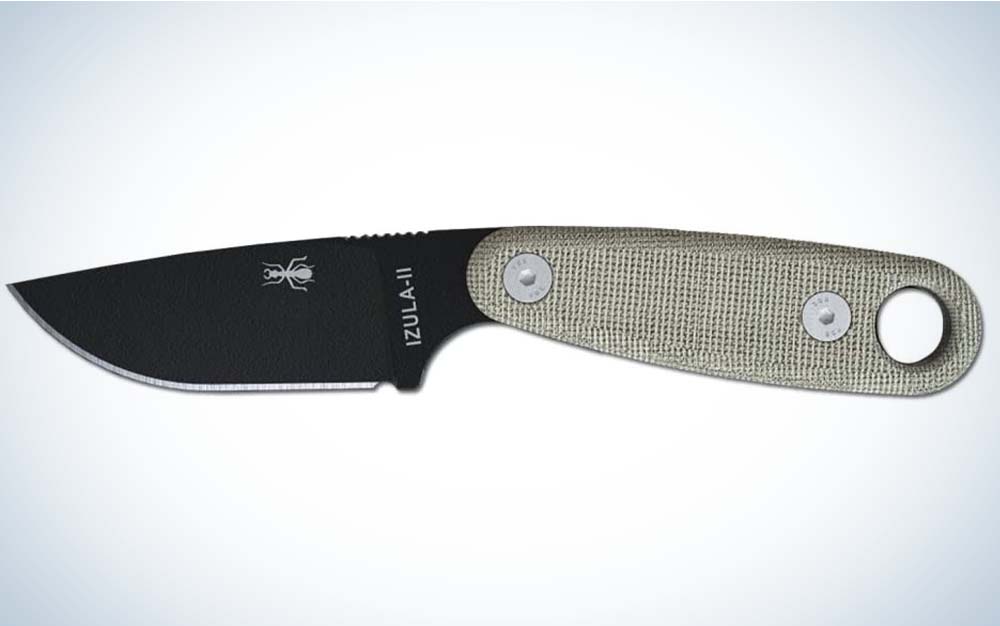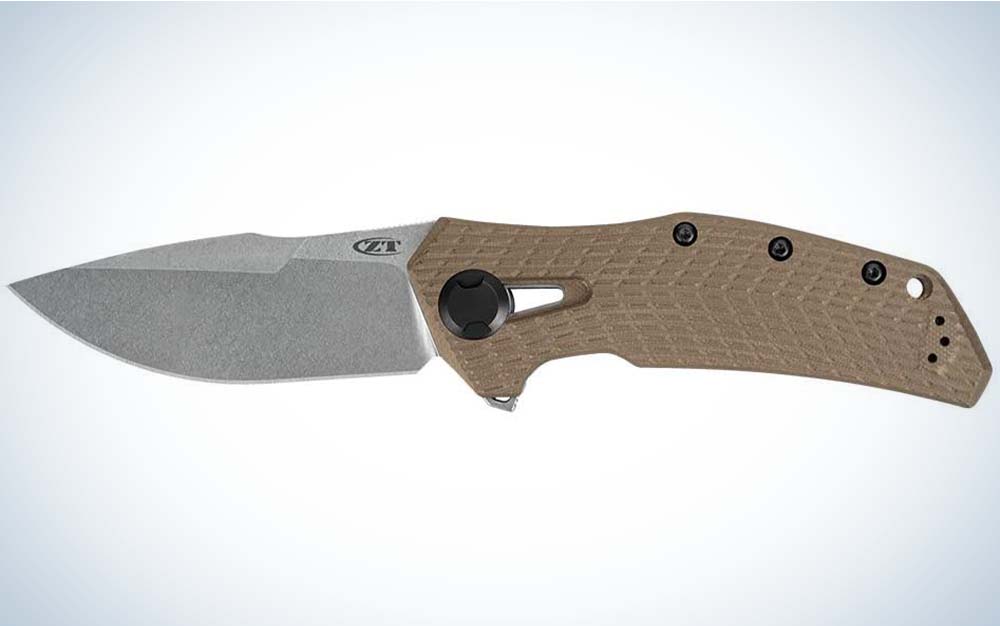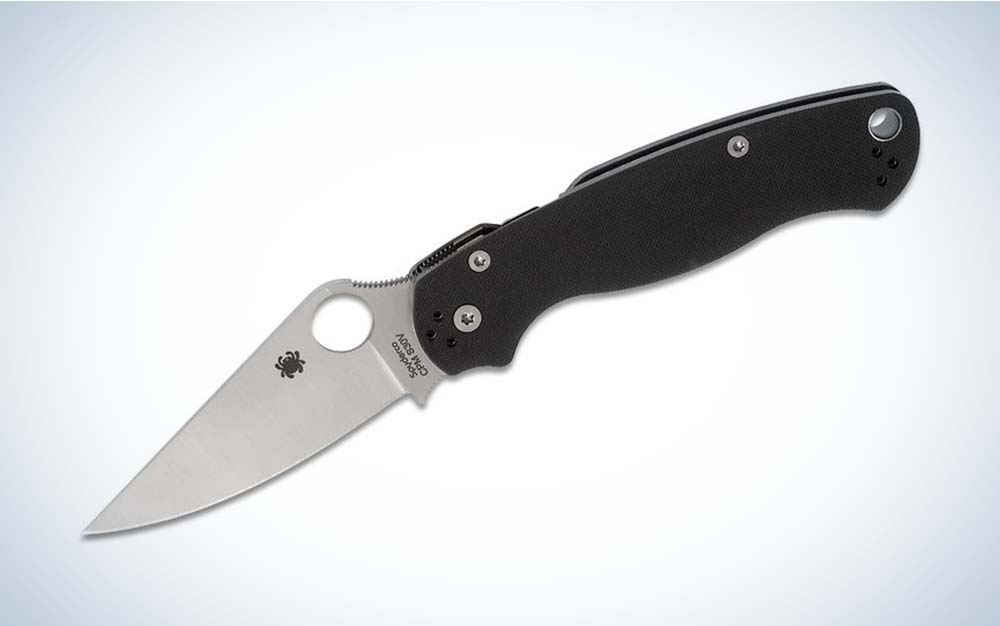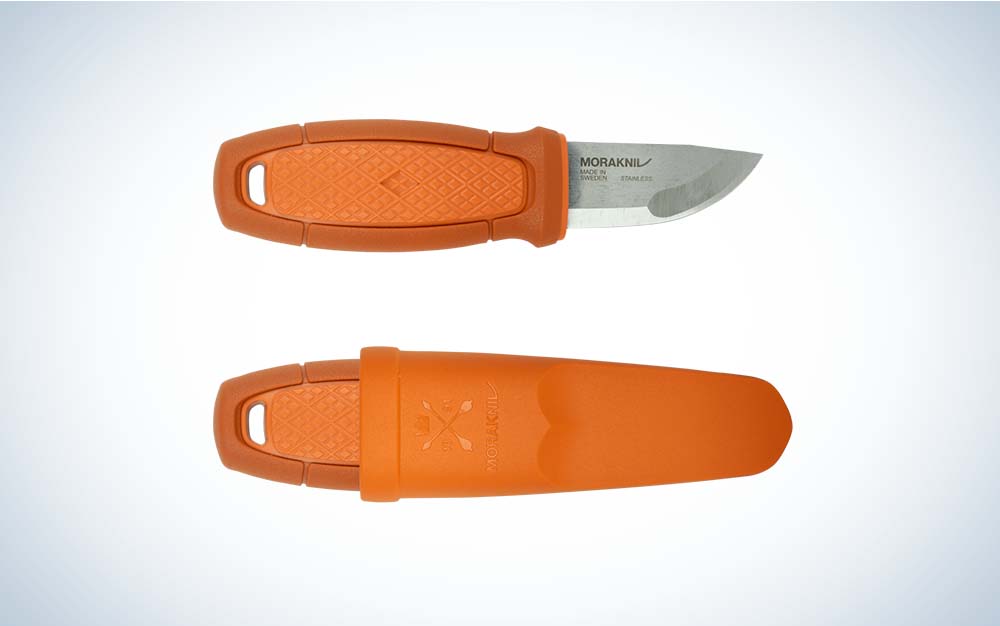We may earn revenue from the products available on this page and participate in affiliate programs. Learn More ›
Updated Apr 17, 2023 10:09 AM
People ask me, “What’s the best EDC knife?” My answer is always, “It depends.” That’s because the best everyday carry knife depends greatly upon what you do for a living and your intended uses. Your situation may best be suited by a multitool, or maybe you have an outdoor job where a larger fixed blade will work best. Maybe you work in a warehouse and need to break down mass quantities of cardboard. You might be in an office where a small blade will get the job done while not landing you in HR for scaring people. Below are my picks for the best EDC knives and multitools that will suit (almost) any situation.
The Best EDC Knives: Reviews and Recommendations
Best for Saltwater: Terrain 365 Invictus
Key Features
- Blade Length: 3 inches
- Steel: Terravantium
- Weight: 3.7 ounces
- Lock: Framelock
- Price: $380
Pros
- Will not rust
- Good edge retention
- Comfortable to use
Cons
- Detent is a little too strong
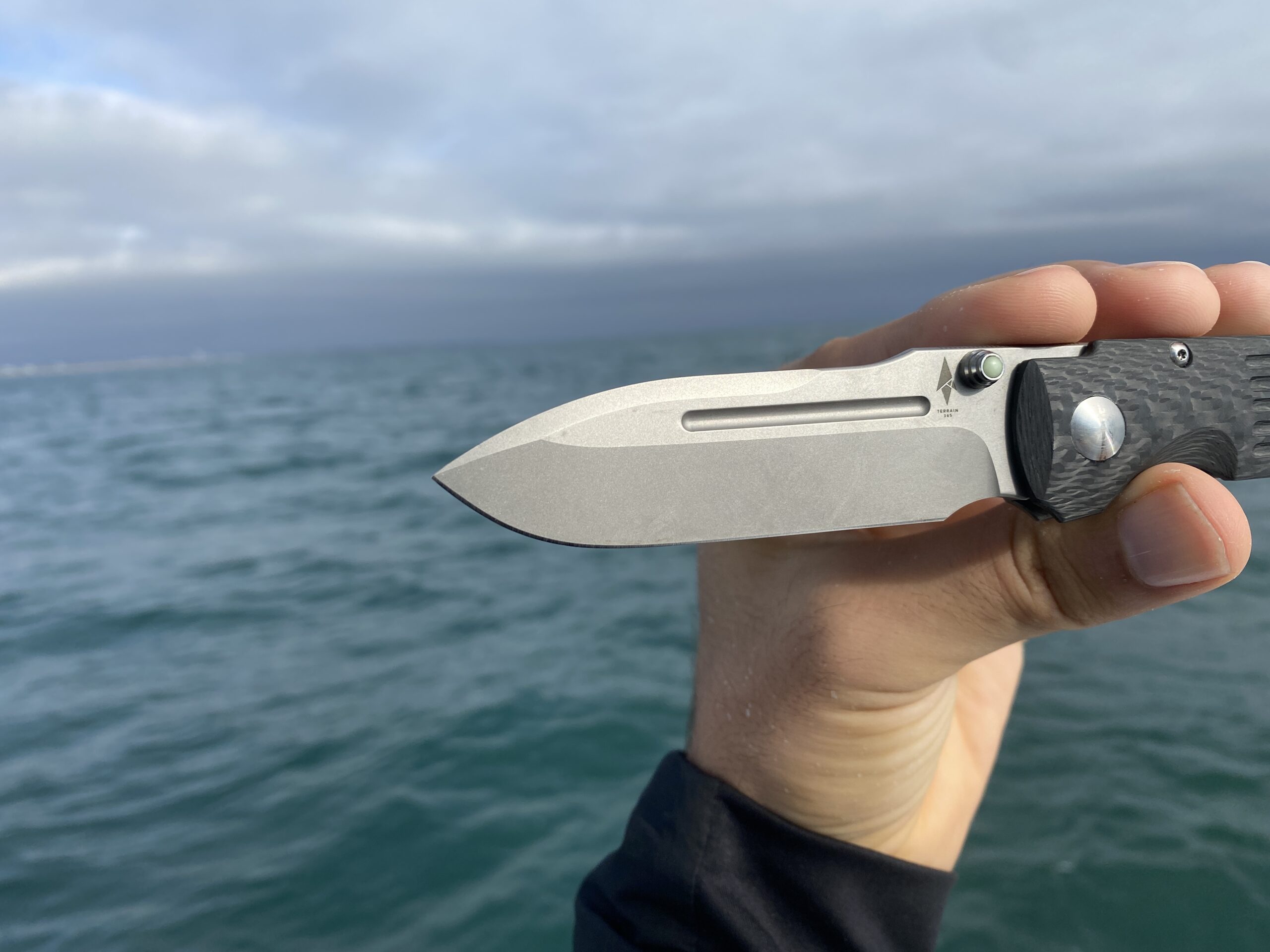
I’ve used my Invictus for EDC, hunting, and fishing this fall. I bought it because of its unique construction and I liked that every component of the knife is corrosion free. So whether I’m wet wading in saltwater or use it to field dress a deer, I don’t have to worry about rust. It has the bank vault click that’s a hallmark of a well made framelock and it rivals many midtechs for it’s fit and finish.
The blade steel used in the Invictus isn’t your typical blade steel, it’s not even steel. Terravantium is a cobalt alloy that doesn’t need to be heat treated. It’s also completely rust proof, non-magnetic, and keeps an edge for a very long time. Although I’ve found it doesn’t keep a razor edge long, it holds a toothy edge seemingly indefinitely. Mine has broken down hundreds of cardboard boxes without needing a touchup.
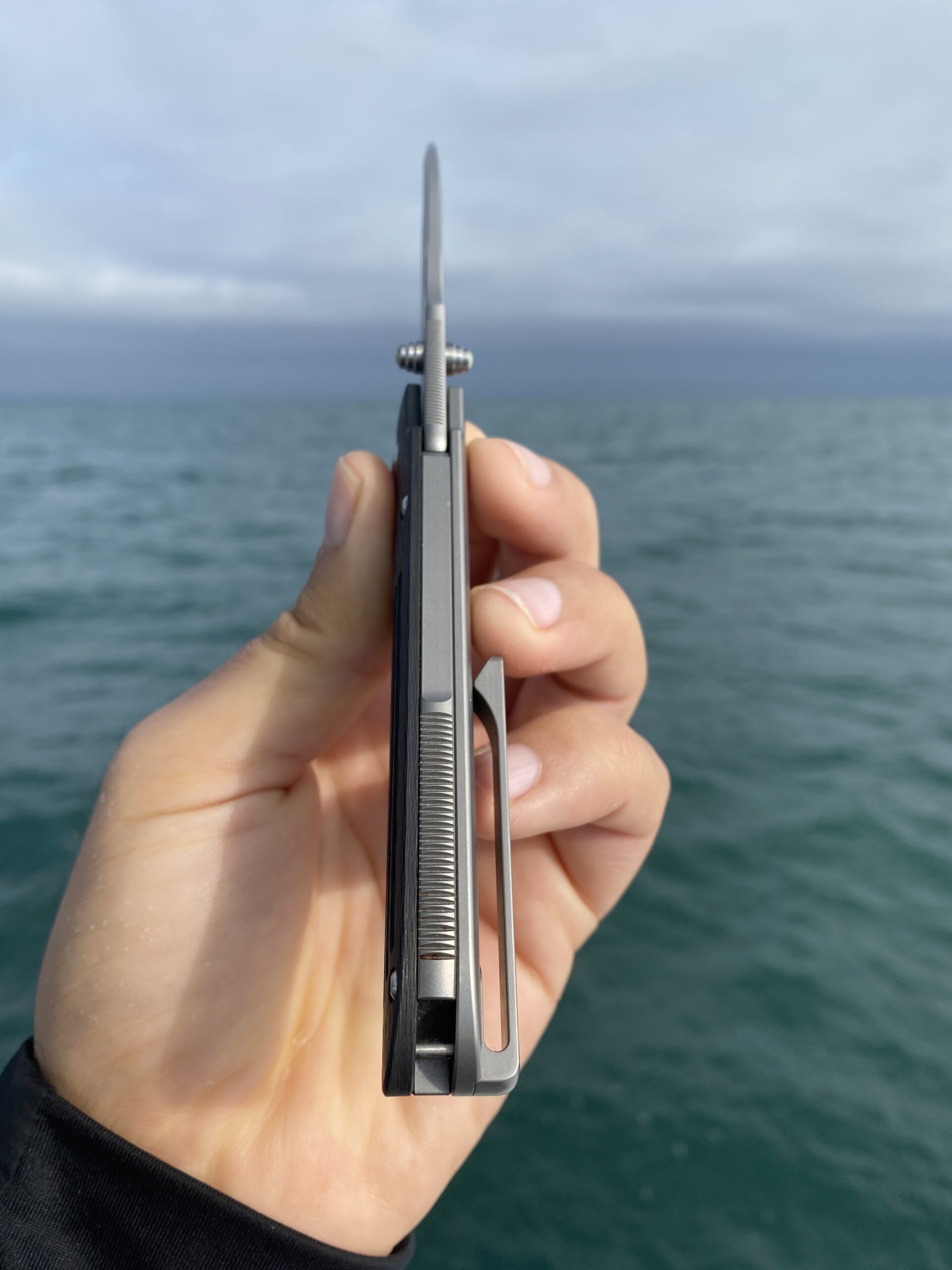
The spearpoint blade shape on the Invictus is ideal for piercing and slicing cuts. The slight distal taper reinforces the point and while I wouldn’t use it as a pry bar, it can take abuse. The ⅛ thickness is a good compromise between toughness and slicing. While the grip looks straight, it’s nicely contoured and has a deep finger choil for a secure grip in all conditions. Terrain 365 offers the knife with titanium, carbon fiber, micarta, and G10 handles. -Scott Einsmann
Best Multi-Tool: Leatherman Charge TTi
Key Features
- Made in U.S.A.
- 19 Tools
- Premium S30V main blade
- 8.89 ounces
- Titanium and stainless steel construction
- Includes Bit Kit and belt sheath to tackle almost any job
Pros
- Versatility means you’re covered in almost any situation
- Pocket, sheath, or lanyard carry options
- All tools and features lock for ease of use and safety
- Blades and saws accessible while closed
- Durable
Cons
The Leatherman Charge TTi is an updated version of the original Charge Ti, and the only big change is the blade steel on the main blade going from 154cm to S30V. I owned the original Ti and carried it exclusively for several years as a line worker and A&P Mechanic, and it was excellent. When it was stolen, I replaced it with the TTi about 7 years ago, and I like it even more. It has a tool for nearly every situation. I’ve carried it hiking and used it for camp tasks including cooking and gear repair. While hunting, I’ve used the hook on the serrated blade for skinning game and the pliers for pulling hide. With the saw, I’ve cleared shooting lanes and trimmed my beard with the scissors. I’ve repaired planes, trucks, sinks, other knives, light fixtures, packs, guns, and furniture with it. The Bit Kit stores in the sheath so you always have a wide variety on hand. If there were some strange rule that I could only own one knife/tool, this would be it. Aside from heavy prying and batoning, the Leatherman Charge TTi can handle any EDC task you can throw at it.
Best Lightweight: Benchmade Bugout
Key Features
- Made in the U.S.A.
- 3.24 inch S30V drop point blade
- AXIS lock
- Grivory handle scales
- 1.85 ounces
Pros
- Easy to carry with low weight and slim profile
- Deep carry pocket clip
- Available in several color combos
- Surprisingly strong for its’ weight
- Lifetime warranty
Cons
- Grivory scales save weight, but they will flex a little under pressure

The Bugout is an ultralight knife that still delivers in the durability and performance departments. Comparable to the Benchmade Griptillian, this knife is an upgrade, and it’s an excellent choice for the backpacker who counts ounces but still wants a blade that will be worth a darn if things go wrong. It’s also perfect for wearing gym shorts or for the user who wants to forget they’re carrying a knife until they need it. When I bought mine, I tested it with the “beaver chew” method to take down a bunch of saplings, which uses a lot of twisting pressure. I also did some bushcrafting with it. While I could feel some flex while twisting and pinching the scales, it never affected performance and always came back to true. The thin blade is an excellent slicer and will easily handle EDC cutting tasks for nearly everyone. I’ve seen Bugouts used hard and was amazed that they held up so well.
Best Small Fixed Blade EDC Knife: ESEE Izula-II
Key Features
- Made in the U.S.A.
- 2.63 inch 1095 carbon blade
- Overall length: 6.75 inches
- 3.2 ounces without sheath
- Canvas Micarta handle scales
- Ambidextrous molded sheath with multiple carry options
Pros
- ESEE no questions asked warranty
- 1095 steel is tough and easy to sharpen
- Sheath can be carried in pocket, on belt, or MOLLE
- Wide range of colors and handles and sheaths available
- Perfect for hard use environments
Cons
- Carrying a fixed blade isn’t legal in some urban areas
- Harder to conceal than a folding knife

The ESEE Izula II gets its name from the Bullet Ant of the Peruvian jungles. It’s small but packs an incredibly painful bite. The Izula and Izula II are no different: small but mighty. I chose the Izula II because it has an additional half inch of handle that allows for a secure, four-finger grip. The Micarta scales are nicely rounded and comfortable and offer great grip in wet or dry conditions, and the clip on the sheath can be oriented sideways for a horizontal carry. I generally carry mine clipped into my pocket, and that gives me the easiest access. This knife is great for someone who is demanding on their blades and tends to chew up knives and break folders. ESEE’s warranty covers literally anything, including house fires! However, you will most likely never use the warranty because it takes A LOT to make an ESEE fail. The Izula is great in hand, and will work as hard as you want it to.
Best Small EDC Folding Knife: Spyderco Dragonfly 2
Key Features
- Made in Japan
- 2.28 inch VG10 blade (1.88 inch cutting edge)
- FRN handle scales (fiberglass reinforced nylon)
- 1.3 ounces
- Lockback lock
Pros
- Small size won’t scare anyone at the office
- Very useful despite its small size
- Easy to carry and conceal
- Available in several configurations, including salt water rated steel
Cons
- Larger than average hands might struggle to get a full grip
The Spyderco Dragonfly 2 is an excellent EDC blade for someone who doesn’t need a big blade or has smaller hands. The Blade to handle ratio and ergonomics give the user excellent cutting control, and the hollow ground VG10 blade slices like a hot knife through butter. The Handle isn’t all that big, but Spyderco’s patented Bi-Directional Texturing still offers up great grip. The thumb ramp and forward finger choil on the blade both utilize jimping for extra traction to lock your hand in place. While the Dragonfly 2 won’t qualify as a hard-use EDC blade, it’s certainly one that can punch above its weight class. This small blade will easily handle what the majority of people use their knives for on a daily basis. For those who prefer a smaller, more controllable blade, the Spyderco Dragonfly 2 is a great choice.
Best Big EDC Folding Knife: Zero Tolerance ZT 0308
Key Features
- Made in the U.S.A.
- 3.75 inch CPM-20CV premium drop point blade
- 7.0 ounces
- Titanium frame lock
- Coyote tan G-10 handle scale
- Flipper tab opening
Pros
- Flipper tab means easy opening for a heavier blade
- Ergonomic handle
- Textured G-10 and titanium are grippy but won’t destroy pockets
- Big enough to handle just about anything
- Wide drop point blade is a good slicer
Cons
- Premium materials (and lots of them) come with a premium price tag
The ZT 0308 is reminiscent of the knives that put ZT on the overbuilt map with some design cues of the 0300. However, the 0308 is more refined and user friendly in both size and aggressiveness of traction. Some people like big folders that can tackle anything, and if that’s you, the ZT 0308 should be a great fit. ZT has a solid lifetime warranty, and has some of the best fit and finish in the knife world. The 20CV steel has great edge retention and in my experience is fairly chip resistant. The 0308 can be had in any color you want, as long as it’s Coyote Tan and Satin Titanium. What it lacks in color options it makes up for in functionality. The Flipper tab doubles as a finger guard and forward choil when the knife is open and offers a great grip when you exert a lot of pressure on it. As far as big EDC folders go, the 0308 performs well in action, fit and finish, and material quality. It also outperforms many other big folders in its ability to slice.
Best Small EDC Multitool: Victorinox Tinker
Key Features
- Made in Switzerland
- 12 tools
- 2.2 ounces
- Non-locking slip joint
- Lifetime warranty
Pros
- Has the most common tools
- Extra capability without extra weight
- Not going to scare anyone at the office
- Classic, reliable design
- Easy to carry in pocket
Cons
With a Victorinox Tinker, some creativity, and enough re-runs of MacGyver, you could make a space station out of what you find in an abandoned warehouse. Well, maybe not, but you can certainly take care of most things that pop up around the house or out on the trail with one of these bad boys. The Tinker is a classic design that’s been around for a long time because it works. It has everything you need and nothing you don’t. Ok, I doubt you’ll need the reamer with a sewing eye, but you never know. The Tinker was my first knife when I was 5, and I was sure I could do anything with it. In fact, one of the first things I did was cut myself because the blades don’t lock. That’s the only real downside to one of these. The Tinker is great as a stand-alone EDC item, but it also makes a great companion to a fixed blade or locking knife. I have one in my truck, my EDC pack, and “the drawer” at home.
Best for Boxes: Spyderco Paramilitary 2
Key Features
- Made in the U.S.A.
- 3.44 inch S45VN blade (3.0 inch Cutting edge)
- Compression lock
- G-10 handle scales
- 3.75 ounces
Pros
- Large handle and forward choil provide a comfy grip
- Blade geometry and flat grind make cutting easy
- Strong, reliable compression lock
- Textured G-10 scales provide great traction
- “Spydie-Hole” easy to open and fun to fidget
Cons
- Takes up a lot of room in pocket
- Spyderco warranty lacks compared to competitors
The Spyderco PM 2 is a cutting and slicing machine. If your job requires breaking down a lot of boxes or other high volume slicing, the PM 2 is a good choice. The handle is large and easy to hold onto for long durations, and the blade geometry allows you to keep slicing even when your blade starts to get dull. The PM 2 is a huge player in the EDC knife arena and regarded by many to be the best. As long as you understand that this knife is designed for slicing and wont double as a sharpened prybar, you should do well. At just under four ounces, it’s not a lightweight EDC knife, but its not a pocket brick either. Spyderco has upgraded their standard base model to S45VN steel, which is an improvement over the last model that used S30V, but the upgrade also bumped up the price. The new steel does hold an edge longer and gives you more slicing goodness between sharpening.
Best General Purpose: Benchmade Osborne 940
Key Features
- Made in the U.S.A.
- 3.4 inch S30V reverse tanto blade
- Aluminum handle scales
- 2.9 ounces
- AXIS lock
Pros
- Excellent blade to handle ratio
- Strong materials without the bulk
- Ambidextrous pockets clip and lock
- Compact when closed
- Minimal pocket space
Cons
- Slim handle design might feel thin for those with XL hands
The Benchmade 940 is all about balance. For a general-purpose knife, you want a steel that holds an edge without being hard to sharpen, and one that’s compact but has enough blade for nearly any task. It should be light, but strong. The 940 hits the sweet spot in nearly all categories and metrics. The blade shape has enough belly to be useful, but the reverse tanto adds strength and geometry for piercing and some prying when no one is looking. It’s easy to carry and easy to use. I’ve taken mine hunting and on thru-hikes. I’ve trekked it up mountains and left it in my pocket while swimming. It seems to feel at home and perform well wherever I find myself.
Read the full Benchmade 940 review for more info.
Best Budget: Morakniv Eldris
Key Features
- Made in Sweden
- 2.12 inch Sandvik stainless steel Scandinavian blade
- 2.15 ounces
- Polymer handle material
- Pocket/ neck sheath
Pros
- Variety of carry options
- Scandi grind easy to sharpen
- Great performance from a budget blade
- Several colors available
- Full four-finger grip
Cons
- Plastic sheath works well but feels cheap

The Morakniv Eldris is popular in bushcraft circles. Drain holes in the bottom of the sheath double as perfect lanyard holes, and even an “S” biner will fit in there. For those who like neck carry or are curious about it, this knife is an awesome choice. This knife is light enough to not bother you but built well enough to handle almost any EDC task out there. This blade is geared towards outdoor/camping EDC tasks, and it excels at them. The only thing you can’t really do is baton anything substantial. Other than that, the Eldris is great for carving, most food prep, camp tasks, and it will open your online order boxes with ease. I carried mine on my neck for a while, and I also used an “S” biner to hang it off my belt loop, which I prefer. Even though it was out in the open, almost no one knew or thought it was a knife. The Eldris proves that good things can come in small packages.
Best Belt Knife: L.T. Wright Knives GNS
Key Features
- Handmade in the U.S.A.
- Blade length: 4.25 inches
- Overall length: 9.5 inches
- CPM-3V saber ground blade
- Canvas Micarta handle scales
- Full grain leather sheath
Pros
- Excellent workmanship
- Lifetime warranty
- Ergonomic handle for prolonged use
- Top-quality materials
- Utilitarian blade shape
Cons
- Due to high demand, you may have to wait 4-6 weeks if there’s no stock

Some people carry belt knives on a daily basis because their line of work requires more than what a small fixed blade or folding knife can deliver. If this is you, look no further than the L.T. Wright GNS. GNS stands for “Go, no show.” This knife is built to work, not be flashy. The blade shape is great for nearly any task from boring a hole to slicing meat, carving wood, or processing game. The GNS is available in a variety of steels and blade grinds, but the Saber ground 3V version is the most versatile and best all-rounder in my experience. There are also a variety of handle materials with different traction patterns, but I like the basic Micarta for its toughness and excellent grip when wet. The GNS is my favorite belt knife, and it’s been my go-to on every hunt, camping/bushcrafting trip, and hike for the past two years. There are left and right-handed sheath options and a choice of regular belt loops or a dangler option to let the knife move more freely when sitting or bending. There are also kydex sheaths available.
Things to Consider When Buying an EDC Knife
The first thing to do when you’re looking for the best EDC knife is to determine how you’ll realistically use it. In reality, most people don’t use their knives for more than opening packages or cutting food while at work. That being said, I’ve worked in a few trades where I depended on my knives and multitools while earning a living. When I was a mechanic, I spent thousands of dollars on quality tools after trying to get by with the cheap stuff. That taught me a valuable lesson and helped me see my knives as well-built tools that I should consider as an investment.

If you only use knives for opening packages or light stuff, anything on this list will do. That being said, I still recommend buying the highest quality you can afford because stuff happens, and there may be a time where you call on your knife to go above and beyond normal tasks.
Part of the EDC culture is about being prepared for what you might encounter. You want to be covered for your normal circumstance and have a little extra just in case. Once you nail down what you do on a daily basis and what you want to be able to do in a pinch, choose a blade that’s designed for those purposes (and get more than one). Sometimes your daily carry will be in the woods, and sometimes it will be at church, the office, or at your kids game. Have tools that suit the environments you spend the most time in.
Another thing you should consider is warranty and customer service. Some companies are great, some not so much. If you ever have a problem, you want to make sure it’ll be solved satisfactorily, especially if you’re paying a premium price.
FAQs
Q: What is the most popular EDC knife?
The most popular EDC knife is constantly changing, but there are some knives and tools that are always good sellers and remain popular as fads come and go. As for knives on this list, the Victorinox Swiss Army Knife, Spyderco PM2, Benchmade 940, and Leatherman are all very popular models and brands in the EDC Knife space. There are so many sub categories in the EDC knife community that it’s not really possible to nail down the single most popular EDC Knife.
Q: How much do EDC knives cost?
There is a wide range of prices for EDC knives and tools. The blades and tools in my list range from under $30 to over $200. While there are exceptions in both directions, I find that the best values and bang for your buck comes in the $70-$150 price range. For the most part, knives and tools in that range will be high quality with lifetime warranties and quality materials that should last a lifetime and then some.
Q: What is the best EDC knife?
I recommend getting an EDC Knife that will fit your needs. Your intended use should be the biggest determining factor in which knife you choose. As a guideline, most people who work an indoor job will be perfectly fine with a folding knife with a 2 to 3.5 inch blade length. Outdoor or mechanical work may be better suited with a multitool or smaller fixed blade, though a regular folding knife can work as well. Figure out what your knife needs to be able to do, and buy the highest quality knife you can that fits your needs.
Why Trust Outdoor Life?
Since 1898, OL has been a leading authority in testing and reviewing hunting gear, fishing tackle, guns and shooting equipment, and much more. We have more than a century-long history of evaluating products, and we’re now bringing that expertise to online reviews. Our editors are experienced outdoorsmen and women, and most importantly, we’re trained journalists. We prioritize field testing and objective data when reviewing products. We conduct interviews with gear manufacturers and engineers as well as outdoor experts so that our readers have an understanding of how and why a product works—or doesn’t.
Advertising does not influence our gear reviews and it never will. While we always focus our coverage on standout products—because we want our readers to be aware of the latest and greatest gear—we also cover the flaws and quirks of any given product.
Final Thoughts on the Best EDC Knives
EDC knives and multitools are a passion of mine. I buy and sell a lot of them, and I appreciate the good ones. If you are new to knives and multitools, don’t be overwhelmed with all the choices. As you try new things, your preferences will change and what you like now, you may not like after using some other knife or multitool. Just start carrying one, and you’ll quickly see what does and doesn’t work for you. Once you get used to EDC’ing a good tool, you’ll wonder how you made it without one.

